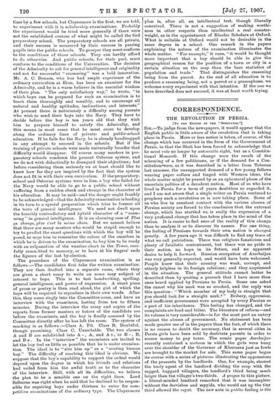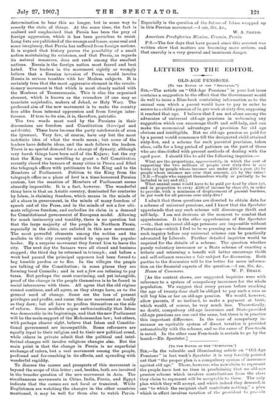CORRESPONDENCE.
THE REVOLUTION IN PERSIA.
MO THE EDITOR OP THE "SPECTATOR,'] Sin,—To judge from the newspapers, it would appear that the English public is little aware of the revolution that is taking place in Persia. More or less notice is taken, of course, of the change which has occurred in the form of the Government of Persia, in that the Shah has been forced to acknowledge that he must rule no longer by autocratic right, but as a Constitu- tional Monarch. If this change were the result of the scheming of a few politicians, or if the demand for a Con- stitutionnvere, as it was described in a letter from Teheran last summer, the unsupported demand of a few young fellows wearing paper collars and tinged with Western ideas, the whole matter might be passed by as an ephemeral phase of the uncertain politics of a decadent nation. Most of us who have lived in Persia for a term of years doubtless so regarded it, and I am not aware that a single writer on Persia ventured to prophesy such a revolution as is now taking place. Some of us who live in constant contact with the various classes of Persian society are forced to the conclusion that the external change, which has startled us, is really the expression of a very profound change that has taken place in the mind of the nation. It is easier to feel sure of the reality of this changes than to analyse it or to discover its causes. For one thing, the feeling of Persians towards their own nation is changed greatly. A few years ago it was difficult to find any trace of what we call patriotism. There was religious fanaticism and plenty of fatalistic contentment, but there was no pride in their nation, • no hope in its future, and no apparent desire to help it forward. Russian occupation of Azerbaijan was very generally expected, and would have been welcomed. People knew that their country was weak, corrupt, and utterly helpless in its foreign relations ; and they acquiesced in the situation. The general attitude cannot better be described than by quoting a proverb that I have more than once heard applied by Persians to Persia. Some one asked the camel why his neck was so crooked, and the reply was this question : "Which member of my body is straight that you should look for a straight neck ? " Bribery, oppression, and inefficient government were accepted by every Persian as a part of his inheritance. This feeling has changed, and the complaints are loud and bitter. The literature of reform—and its volume is very considerable—is for the most part an outcry against the abuses of government. No statement has been made greater use of in the papers thanthe fact, of which there is no reason to doubt the accuracy, that in several cities in Persia girls have been sold by destitute parents in order to secure money to pay taxes. The comic paper Azerbaijan recently contained a cartoon in which the girls were hung over the shoulder of the Governor of Khurasau just as fowls are brought to the market for sale. This samo paper began its course with a series of pictures illustrating the oppressions of the peasants by the landlords. One, for example, showed the burly agent of the landlord dividing the crop with the ragged, haggard villagers, the landlord's third being much larger than the villager's two-thirds. A propos to this picture, a liberalAninded landlord remarked • that it was incomplete 'without the dervishes and seyyids, who would eat up the tiny third allowed the rayat. The new note in public feeling is tho ; determination to bear this no longer, but in some way to remedy the state of things. At the same time, the fact is realised and emphasised that Persia has been the prey of foreign aggression, which it has been powerless to resist. Long lists are published of the wrongs and losses, some real and some imaginary, that Persia has suffered from foreign nations. It is argued that history proves the possibility of a small nation maintaining its existence, and that Persia, as regards its natural resources, does not rank among the smallest nations. • Russia is the foreign nation most feared and best hated. The leaders in the movement rightly or wrongly believe that a Russian invasion of Persia would involve Russia in serious troubles with her Moslem subjects. It is certainly true that the most aggressive element in the revolu- tionary movement is that which is most closely united with the Moslems of Transcaucasia. This is also the organised element, which is known as the crusaders (if one may so translate majahadin, makers of Jehad, or Holy War). The professed aim of the new movement is to make the country free alike from internal oppression and from foreign inter- ference. If true to its aim, it is, therefore, patriotic.
The two words most used by the Persians in their discussions are freedom and Constitution (harriyat and 4hritta). These have become the party catchwords of even the ignorant. Very few, of course, have any but the most indefinite idea of what the words mean ; but some of the leaders have definite ideas, and the mob follows the leaders. There is no special demand for a change of dynasty, although very harsh things have been said of the Kajars ; but the cry that the King was unwilling to grant a full Constitution recently closed the bazaars of many cities in Persia and filled the telegraph offices with petitioners to the King and to the Members of Parliament. Petition to the King from the telegraph office as a place of bast is a time-honoured Persian custom, but the mention of Members of Parliament seems absurdly impossible. It is a fact, however. The wonderful thing here is that an Asiatic country; dominated for centuries by Islam, is claiming freedom, which means in the minds of all a share in government, in the minds of many freedom of speech and of the Press, and in the minds of. not a few ulti- mate religious freedom, and embodies its claim in a demand for Constitutional government of European model. Allowing for much insincerity and timidity, there is no question but that the large majority of the people in Northern Persia, especially in the cities, are enlisted in this new movement. The most powerful elements among the nobles and the mullahs in this city recently united to oppose the popular leader. By a surprise movement they forced him to leave the city. The next day the bazaars were all closed and business stopped ; the third day be returned in triumph ; and before a week had passed the principal opposers had been forced to beg bumble pardon or to fiee. In the villages the people are talking of the Constitution ; in some places they are forming local Councils ; and in not afew are refusing to pay taxes. But perhaps the most convincing, and yet intangible, proof of the change in the people themselves is to be found in social intercourse with them. All agree that the old regime cannot continue, and all agree, as they always have, as to the general need of change. Some see the loss of present privileges and profits, and curse the new movement as loudly as they dare ; but all have to profess themselves on the side of reform. Some mullahs argue enthusiastically that Islam was democratic in its beginnings, and that the new Parliament will be the main support of the Mohammedan law; but others, with perhaps clearer sight, believe that Islam and Constitu- tional government are incompatible. Some reformers are equally loyal to their religion and to their new political creed, while others in private admit that the political and intel- lectual changes will involve, religious changes also. But the main point is that the change in Persia is no superficial exchange of rulers, but a real movement among the people, profound and far-reaching in its effects, and spreading with wonderful rapidity.
To discuss the causes and prospects of this movement is beyond the scope of this letter ; and, besides, both are involved in the broader question of the new movement in Asia. The simultaneous movements in China, India, Persia, and Egypt indicate that the causes are not local or transient. While Englishmen are watching the changes in the other countries mentioned, it may be well for them also to watch Persia. Especially is the question of the future of Islam wrapped up in this Persian movement.—I am, Sir, &c., W. A. SHEDD.
American Presbyterian Mission, Urumia, Persia.
P.S.—The few days that have passed since this account was written show that matters are becoming more serious, and that anarchy is a very general and imminent danger.







































 Previous page
Previous page